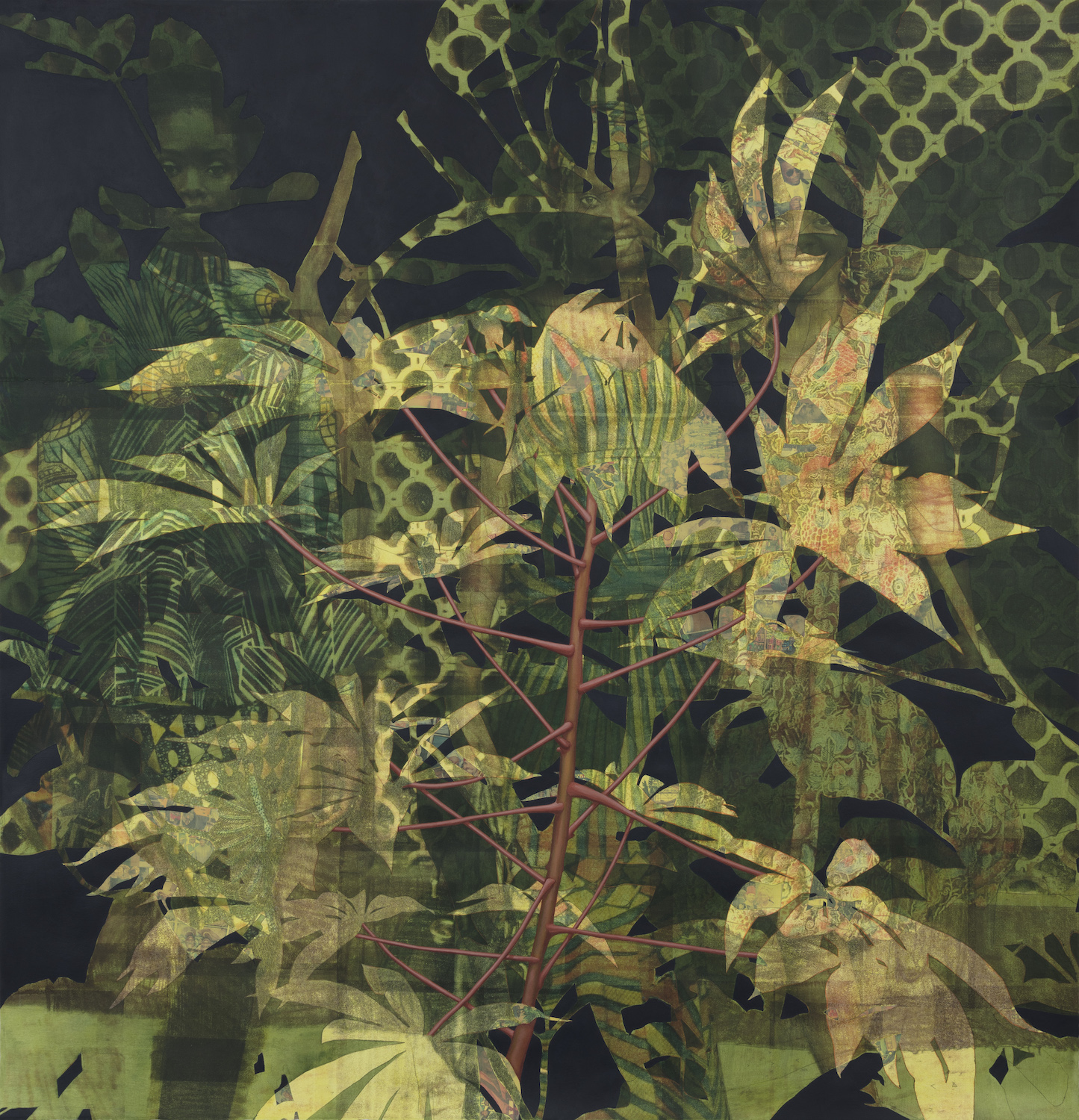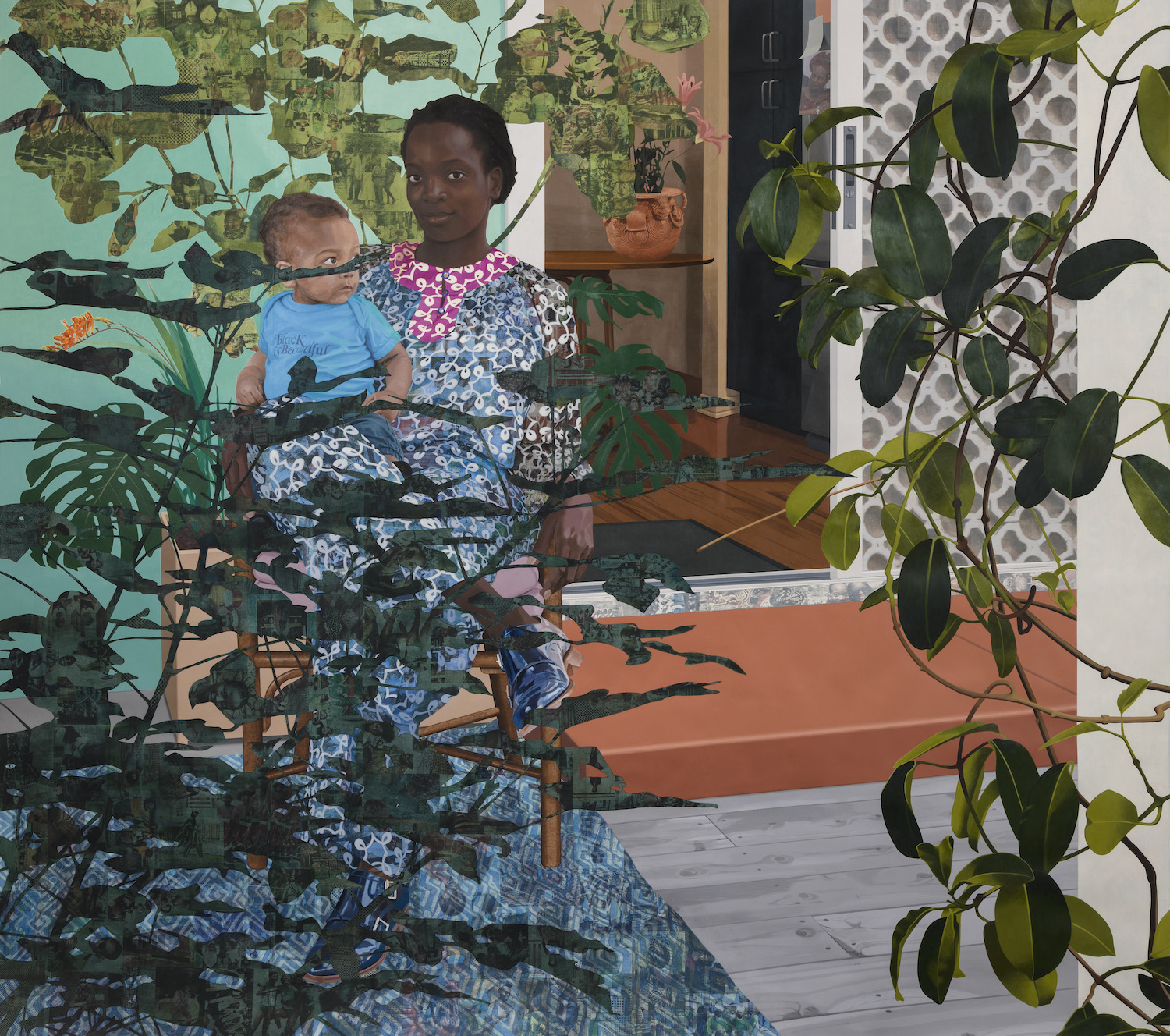Njideka Akunyili Crosby is having quite the year. Her figurative paintings are on the walls of esteemed museums and institutions across the country, often featuring portraits of herself, friends and family. Akunyili Crosby’s unique style consists of painted, drawn and collaged elements that she blends with a distinctive photo-transfer technique. She uses imagery sourced from magazines, catalogs and her own photographs.
Born in Enugu, Nigeria in 1983, Akunyili Crosby grew up between Enugu and Lagos, and moved to the US when she was 16. Now living in Los Angeles, she brings together these varied influences, seeking spaces where they diverge and intersect. Since earning her MFA from Yale in 2011, she has had exhibitions in major institutions nationally and abroad. She received the highly coveted MacArthur “Genius” Fellowship in 2017, and the United States Artists’ fellowship in 2021. Historic, cultural and diasporic references are at the core of her work. She touches on issues that speak to many different people, places and times, all elegantly woven together in layers of visually stunning imagery.
Akunyili Crosby tells personal and collective cross-cultural stories in paintings that are captivating and contemplative. In November 2021, the Metropolitan Museum of Art commissioned the artist to create a wallpaper that has become an exemplary case of how she addresses complex issues. Made for Before Yesterday We Could Fly: An Afrofuturist Period Room, she conceived of Thriving and Potential, Displaced (Again and Again and…) (2021) a gorgeous green vinyl backdrop. The Afrofuturist installation is one of the Met’s “period rooms,”—recreations of domestic spaces intended to be studied as representations of a specific time.
The Afrofuturist Room addresses the history of the land upon which the museum was built. Called Seneca Village, the area was home to a flourishing community of landowners and tenants who were mostly Black. The city seized the land in 1857 to create Central Park and displaced the residents. The new installation recognizes this history and imagines what a period room might look like if Seneca Village had remained. In doing so, the room shifts from the tradition of focusing on one specific time and celebrates the African and diasporic belief that the past, present and future are connected.
Embracing the layered history told through the installation, Akunyili Crosby’s wallpaper includes images of an archival map of Seneca Village from 1856, which are blended with 19th century photographs of Black New Yorkers, as well as contemporary African diasporic representations. Weaving through these images are verdant okra plants, a crop with significant history as it was carried along with enslaved people through the Middle Passage from Africa to America.
As is common with Akunyili Crosby’s large-scale installations, the wall-paper was originally created as a painting on paper. Previously unseen publicly, the painting is now included in the artist’s current solo exhibition at the Blanton Museum of Art in Austin, Texas. Just four works make up the show, all of which were made during the pandemic, giving a glimpse into the artist’s life at home in Los Angeles.

Dwellers: Native One, 2019 © Njideka Akunyili Crosby, courtesy the artist, Victoria Miro, and David Zwirner, Photographer: Jeff Mclane
These new works underscore Akunyili Crosby’s interest in plants, including the aforementioned okra. Having studied biology in college and grown up with parents heavily involved in science and academics, she often features the natural environment in her work. In addition to the painting now adorning the Met’s wallpaper, the other three works in the Blanton show focus closely on plant species found both in Los Angeles and Lagos. The largest work is Still You Bloom in This Land of No Gardens (2020), a self-portrait holding her young child on a porch surrounded by plants. The artist looks straight at the viewer with calm, assured and loving eyes. Her child wears a shirt adorned with the words “black is beautiful.” The pair are a ideal representation of the relationship between mother and child.
Returning to her alma mater, Akunyili Crosby’s work will also be the subject of a solo show opening in September at Yale University’s Center for British Art. The exhibition is the third and final in a series curated by Pulitzer Prize–winning author Hilton Als. The show focuses on her ongoing series The Beautyful Ones, a reference to the debut novel of Ghanaian author Ayi Kwei Armah from 1968. Titled The Beautyful Ones Are Not Yet Born, the novel follows a man as he navigates postcolonial Ghana in a formative period of unrest, loss and political awakening. The series, begun in 2012, features portraits of Nigerian children from her family photographs, as well as images she took on trips to Nigeria.
In addition to her work as an artist, Akunyili Crosby is a dedicated climate activist. She is a founding member of the Environmental Council at the Museum of Contemporary Art in Los Angeles, the first of its kind for a major art museum in the US. The council provides funds for the institution’s commitment to carbon negativity and carbon-free energy and supports exhibitions and educational programs that address climate, conservation and environmental justice.
In another large-scale installation, Akunyili Crosby showed her support of climate activism by contributing to the visual campaign A Cool Million. Founded by three artist-led collectives: For Freedoms, Art + Climate Action and Art into Acres. The campaign launched in April and turned pieces by leading artists into large-scale public works that were displayed on billboards and in museum spaces across California. The goal of the initiative was to raise climate awareness and funds for the conservation of one million acres of forest that is crucial to supporting the state’s hydrological system. Her work, Dwellers: Native One (2019), was transformed into a window vinyl for the Museum of the African Diaspora (MoAD) in San Francisco. The installation, on view through mid-September, features lush, dense plants indigenous to Nigeria layered with photographic transfers of the artist and her sister in their ancestral village, as well as an image of a woman advertising African wax-cloth fabric.
In January of 2023, Akunyili Crosby is set to kick off the exhibition program for David Zwirner’s new Los Angeles outpost. As LA begins to feature more of her work, she celebrates the similarities and differences between her African heritage and new home.
Visually stunning, captivating and laden with significance, she always tells complex, transnational stories and underscores the beauty of embracing multiple cultures.
See more of Akunyili Crosby’s work upcoming at Yales Center for British Art, then showing at The Huntington Feb 15-June 12, 2023.
Info: https://britishart.yale.edu/news-and-press/announcing-hilton-als-series-njideka-akunyili-crosby

